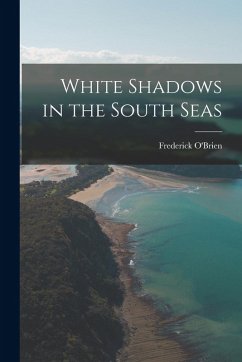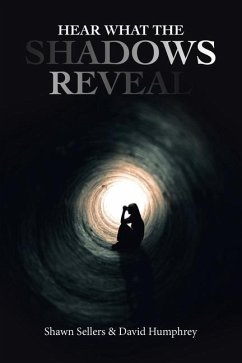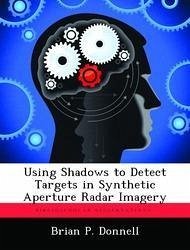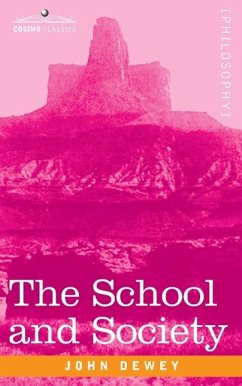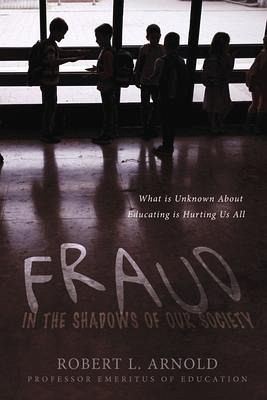
Robert L Arnold
Broschiertes Buch
Fraud in the Shadows of Our Society
What Is Unknown about Educating Is Hurting Us All
Versandkostenfrei!
Versandfertig in über 4 Wochen

PAYBACK Punkte
8 °P sammeln!




Where did the current anti-social behaviors come from that currently involve so many citizens of this country and the world? This author has spent the last 70+ years intensively studying all aspects of conventional public elementary and middle schools in this country, the results of which have identified the parts of the current system that are failing our students. In response to this crisis, this book introduces the concepts, theories, and models created by reputable scholars.
Born in 1931, Robert Arnold began his education on a nearly self-sufficient farm where he participated in all aspects of farming including planting, cultivating, and harvesting crops, raising and caring for farm animals, and doing whatever was necessary to survive, all the while learning about life in all its manifestations. He earned a Bachelor of Science degree from Potsdam State Teachers College in 1953 with a license to teach the common school subjects N-9. He began his career as a teacher in "self-contained" public elementary classrooms at the third and sixth grades, followed by employment at the middle and junior high school levels, teaching departmental social studies and general science. He completed a Master of Arts Degree from Teaches College Columbia University in 1954 just prior to entering service in the military. After serving in the US Army during the Korea campaign as a Troop Information and Education NCO he was appointed to the rank of Assistant Professor of Education as a demonstration teacher in the Potsdam College's Campus Laboratory School within the Education Department. It was then that he partnered with a member of the College's History Department in the development of The Discovery Approach to the Teaching of Social Studies. Students in this project were involved in constructing knowledge in history and geography as young historians and geographers. They utilized the methods and materials of these disciplines to create in-depth knowledge regarding their local region. The successes of that experience resulted in an epiphany regarding his teaching philosophy and practice. He then dedicated his career to expanding and promoting this methodology across this country, believing that it holds important keys to changes in elementary and middle school experiences that integrates two longstanding opposing viewpoints, one promoted by child development advocates and the other by subject matter interests. This approach to teaching and learning became accepted with enthusiasm by state and national level decision makers with interests in history and geography. This led to invitations for demonstrations before meetings of the National Council for the Social Studies, the American Association for Supervision and Curriculum Development, and the New York State Historical Society. Interested public schools included Reidsville, NC, Mentor, Ohio, and many other locations across this country including major universities such as the University of California at Berkley, Illinois State University at Normal, Ill, and The University of North Carolina at Greensboro, NC. The demonstrations involved selected local primary sources of information assembled specifically for each region where participants were engaged in historical and geographic inquiry utilizing the methods and materials of these disciplines. Unfortunately, the enthusiasm generated through these workshops could not be sustained due to limited technology for accessing the documents and making them accessible in the classroom. The quality of the images was poor, and it wasn't until the late eighties and nineties that digital technology had advanced in making original documents for local regions readily accessible for learning activities in the classroom. By that time the enthusiasm of the 1960's had waned. In 1960 Robert entered a doctoral program majoring in Teaching and Curriculum Development at Teachers College Columbia University with a miner in Developmental Psychology. He enrolled in a course taught by Professor Philip Phenix entitled Ways of Knowing that offered a significant expansion of the principles of inquiry that had been studied within the disciplines of history and geography. All members of this course were asked to interview persons whose reputations had been established as experts in their fields of interest, embracing all areas of general education offered in conventional schools and universities. The interviews were designed to determine what these scholars considered the methods and materials of their disciplines to be including modes of inquiry, key concepts, and organizing principles. The results of these interviews were analyzed, and the conclusions were grouped based on similarities of structure and processes of the disciplines involved. The results have been published in Phenix's book entitled Realms of Meaning - A Philosophy of Curriculum for General Education. There are six interrelated realms of meaning identified - Empirics contain all the sciences including social sciences, Symbolics contain all languages including mathematics, Aesthetics contain all the arts and architecture, Synoptics contain history, geography, cultural anthropology, religion and philosophy, Ethics includes matters of morality, and Synnoetics relates to self-knowledge. What had been learned regarding the Potsdam Project that involved local history and geography was found consistent with Phenix's Synoptic Realm. The schematic expanded the Synoptic Realm to include the other five realms and disciplines of the general education curriculum. At this time, Robert was appointed an assistant Professor of Education at Jersey City State College with responsibilities for instruction in psychology and curricular construction, conducting supervision of elementary education candidates as they participated in classrooms across the region surrounding the College. Having background from Phenix's class, he was prepared to determine the results of engagement with an experimental group of teacher candidates at the freshman level utilizing the methods and materials of the disciplines in their general education program. He proposed to take responsibility for a group of twenty elementary teacher majors as their sole facilitator of experiences in general education. The successes of this project led to an appointment as an Associate Professor of Education at The State University College at Plattsburgh, NY where he initiated a project entitled the Open Curriculum. This project continued what had been learned about the validity of Phenix's formulation involving all freshman students enrolled in general education as majors in elementary education. In 1973 he completed all the requirements as a certified candidate for an EdD degree subject to completing a dissertation. Having developed The Environmental Relationships Test based on the Potsdam experiences with junior high school students, he proposed to do a validation study of this test as his dissertation. Having found limited acceptance for this project and since he had moved on to other venues he chose to write and publish his findings resulting from his many firsthand experiences. This Plattsburgh project was designed to break the lockstep format of its teacher education program and to replace it with an inquiry-oriented plan for direct engagement in the disciplines of general education. He served as the curriculum coordinator for this project, involving three hundred students, and twenty full time faculty; also included were teachers from the campus laboratory school. The plan featured several innovative changes that led to resistance by the members of administration with perceived responsibilities for maintaining the established routines. Despite excellent endorsements by scholars in this field, the project was terminated after three years, and traditional instruction was resumed for a period. He then initiated a subsequent plan called the Block Program that featured the teacher education faculty who had been involved in teaching traditional methods and materials of teaching. The Block Program featured three levels that began at the junior year for elementary majors. The first block was dedicated to study of the foundations for quality education, drawing upon the experiences of the past with additional dimensions. He facilitated the activities offered in that block for over thirty years. It was anticipated that block two would build upon the concepts developed at the first block emphasizing an inquiry dimension. However, coordination between the faculties of blocks one and two did not materialize due mainly to traditional faculty in block two who were steadfastly oriented to lesson planning and teaching as they had been taught. The third block offered student teaching experiences that led to certification as classroom teachers, supported by traditions that had existed at that institution since its inception as a Normal School. After retiring from Plattsburgh in 1992 he became an adjunct professor working with all three blocks at both the undergraduate and graduate levels. He left that institution in 2003 and began writing and publishing essays dealing with issues in education along with excursions into the field of primary health care and leadership training in industry. He taught courses in personal health and environmental education at the junior colleges of the area. He served as the president of TruVu International Inc., an R&D enterprise researching the potential uses of color microfiche and automated projection equipment for improving accessibility of primary source materials required for engaging history and geography as ways of creating knowledge. In 2013 he published a book entitled: Remaking Our Schools for the Twenty-First Century - A Blueprint for Change/Improvement in our Educational Systems. Since then, he has written a series of books on educational issues still at various levels of editing before presentation to publishers. The current volume entitled: Fraud in the Shadows of Our Society - What is unknown about educating is hurting us all addresses the relationships between current social unrest and the experiential dimensions of public elementary schools.
Produktdetails
- Verlag: Bookbaby
- Seitenzahl: 252
- Erscheinungstermin: 15. Dezember 2022
- Englisch
- Abmessung: 229mm x 152mm x 15mm
- Gewicht: 404g
- ISBN-13: 9781667863931
- ISBN-10: 1667863932
- Artikelnr.: 66354428
Herstellerkennzeichnung
Libri GmbH
Europaallee 1
36244 Bad Hersfeld
gpsr@libri.de
Für dieses Produkt wurde noch keine Bewertung abgegeben. Wir würden uns sehr freuen, wenn du die erste Bewertung schreibst!
Eine Bewertung schreiben
Eine Bewertung schreiben
Andere Kunden interessierten sich für




![Progress of Education in Nova Scotia During Fifty Years; and, Lights and Shadows in the Life of an Old Teacher [microform] Cover Progress of Education in Nova Scotia During Fifty Years; and, Lights and Shadows in the Life of an Old Teacher [microform]](https://bilder.buecher.de/produkte/66/66190/66190271n.jpg)
